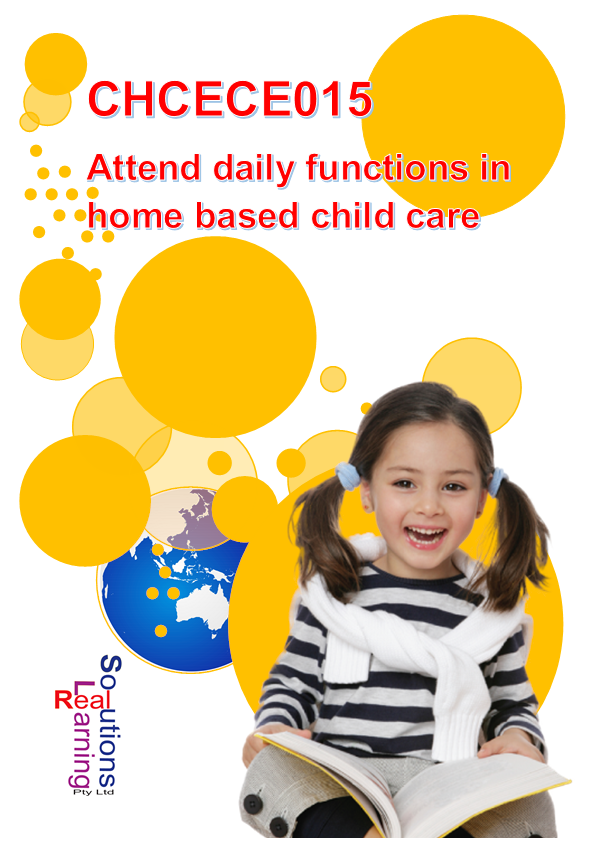- CHC - Community Services
- >
- CHC - Certificate III Level Qualifications
- >
- CHC30121 - Certificate III in Early Childhood Education and Care
- >
- CHCECE015 - Attend to daily functions in home based child care
CHCECE015 - Attend to daily functions in home based child care
SKU:
CHCECE015-WBK
A$36.32
A$36.32
Unavailable
per item
This unit describes the skills and knowledge required to work with families to plan and attend to the daily functions as a home-based care provider.
This unit applies to those providing home-based care for children and may include the contexts of nanny, governess, home tutor or home help.
No licensing, legislative or certification requirements apply to this unit at the time of publication.
This unit applies to those providing home-based care for children and may include the contexts of nanny, governess, home tutor or home help.
No licensing, legislative or certification requirements apply to this unit at the time of publication.
Performance Evidence
The candidate must show evidence of the ability to complete tasks outlined in elements and performance criteria of this unit, manage tasks and manage contingencies in the context of the job role. There must be demonstrated evidence that the candidate has completed the following tasks:
The candidate must be able to demonstrate essential knowledge required to effectively do the task outlined in elements and performance criteria of this unit, manage the task and manage contingencies in the context of the work role. These include knowledge of:
Skills must be demonstrated in the workplace.
In addition, simulations and scenarios must be used where the full range of contexts and situations cannot be provided in the workplace or may occur only rarely. These are situations relating to emergency or unplanned procedures where assessment in these circumstances would be unsafe or is impractical.
Simulated assessment environments must simulate the real-life working environment where these skills and knowledge would be performed, with all the relevant equipment and resources of that working environment.
Assessment must ensure use of:
The candidate must show evidence of the ability to complete tasks outlined in elements and performance criteria of this unit, manage tasks and manage contingencies in the context of the job role. There must be demonstrated evidence that the candidate has completed the following tasks:
- engaged in discussion with at least two carers/families about care requirements, including:
- discussing expectations and limitations of service with carer/family
- collaborating with carer/family to identify child’s needs and developed a plan for attending to daily care functions
- strategies to support families’ values when caring for the child
- provided care to at least two children of varying ages
- demonstrated appropriate response to unexpected circumstances, including:
- communicating with carer/family
- documenting changes
- advising on alternative arrangements
- reviewed at least one program in consultation with carer/family and made variations to program as required
The candidate must be able to demonstrate essential knowledge required to effectively do the task outlined in elements and performance criteria of this unit, manage the task and manage contingencies in the context of the work role. These include knowledge of:
- developmental stages of babies and children
- family values and beliefs
- legislation and regulations relevant to the home-based care environment, including:
- behaviour support procedures
- confidentiality
- insurances
- obligations under child protection legislation
- organisational policies and procedures
- work health and safety regulations
- safety issues and risk management strategies for children’s health and safety in a variety of contexts, including:
- allergies and related medications
- appropriate meal preparation and provisions based on national guidelines for nutrition of children and adolescents
- basic home fire safety including high-risk groups, behaviour that contributes to fire injury and fatalities, and smoke alarm placement, installation and maintenance
- contingency management processes
- excursions and travel situations
- outdoor and indoor play areas.
Skills must be demonstrated in the workplace.
In addition, simulations and scenarios must be used where the full range of contexts and situations cannot be provided in the workplace or may occur only rarely. These are situations relating to emergency or unplanned procedures where assessment in these circumstances would be unsafe or is impractical.
Simulated assessment environments must simulate the real-life working environment where these skills and knowledge would be performed, with all the relevant equipment and resources of that working environment.
Assessment must ensure use of:
- National Quality Framework for Early Childhood Education and Care
- the relevant approved learning framework under the National Quality Framework for Early Childhood Education and Care.
